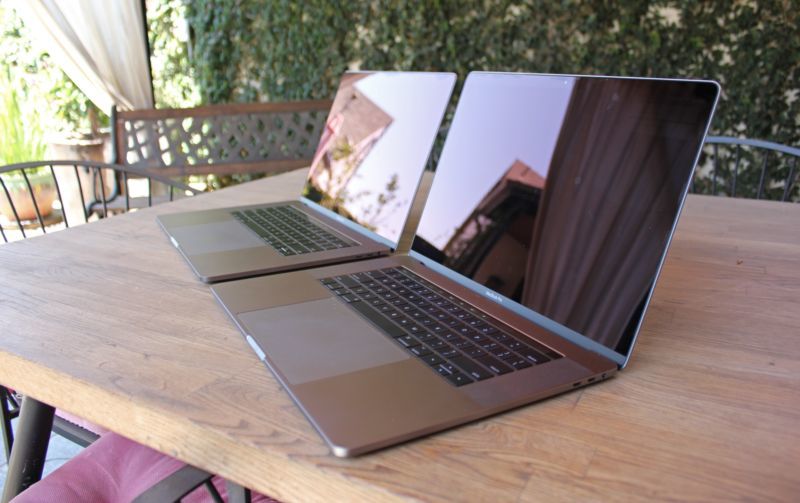
Apple has again acknowledged failures in MacBook butterfly keyboards and apologized. The apology was included in a Wall Street Journal report by prominent tech journalist Joanna Stern pointing out that, like some others, she encountered a keyboard failure in her 2018 MacBook Air.
Stern published the following statement sent to her by an Apple spokesperson:
We are aware that a small number of users are having issues with their third-generation butterfly keyboard and for that we are sorry. The vast majority of Mac notebook customers are having a positive experience with the new keyboard.
The spokesperson also advised users to contact Apple customer support if they had a problem with the keyboards, Stern wrote.
Anecdotally, MacBooks are very common among writers and journalists, so it hasn't helped Apple's situation that people with platforms to write about their tech have experienced the problem. In this case, Stern twisted the knife with a cheeky gimmick whereby readers could toggle between versions of the article that are written normally and versions that are written with various reported keyboard problems. Those issues include repeated Ts or missing Rs and Es.The keyboards are controversial even when not accounting for the failures. Apple maintains there is a silent majority who like the experience of typing on keyboards using the butterfly design introduced a few years ago. But there is a very vocal group of people who feel the keyboards are unpleasant to type on. The Ars Technica staff are starkly divided in their opinions on the keyboards, for example.
Apple introduced the butterfly design in the MacBook before bringing it to the MacBook Pro in 2016 and the MacBook Air last year. The original version of the keyboard had an unusually high failure rate, and Apple revised it with a subtly changed second-generation butterfly keyboard design in the 2017 MacBook Pro. That model had fewer failures, according to documents leaked to AppleInsider, but there were still enough problems that Apple decided to include it in a keyboard repair program alongside the machines using the first-generation design.The problem was likely caused by dust making its way underneath the keys and interfering with the butterfly mechanism. In 2018, Apple added a membrane to a third-generation design. The company said it added this membrane to reduce typing noise, but media outlets discovered that it might have reduced the likelihood of dust getting into the mechanism. Apple did not speak to this one way or the other, but the company may have been unable to comment on account of pending lawsuits. Computers with the third-generation keyboard (2018 MacBook Pros and MacBook Airs) are not covered in the special keyboard repair program.
It's important to note that we don't have any context as to how widespread these failures are. Are they more common than failures in keyboards made by other manufacturers like HP or Lenovo? Who knows. What percentage of 2018 MacBook users are experiencing them? Again, we don't know. This problem may or may not be much more widespread than Apple would like us to think, but it's also possible that it's extremely rare instead.
That lack of clarity poses buyers with a frustrating dilemma.
Warranties, repair programs, and AppleCare
I'm among those users who have been affected by butterfly keyboard failures, albeit in an earlier iteration: my 2016 MacBook Pro's keyboard failed after about 18 months. Apple replaced it with the second-generation keyboard used in the 2017 MacBook Pro, and I haven't had any problems since. I didn't have to pay for the repair because I had AppleCare—an expanded warranty program that offers free repairs for most hardware failures for three years—but the receipt Apple gave me stated that it would have cost more than $700 otherwise.
2018 MacBook Pros and MacBook Airs with the third-generation keyboards are still covered by their first-year warranties, so if you have the problem and don't have AppleCare, you can get it fixed. But if Apple doesn't extend the repair program to include those models, users could find themselves in frustrating and expensive circumstances months down the line if they have not purchased AppleCare.Also, AppleCare is expensive, and it's not available in all regions. And many users do not have Apple Stores nearby. That's a problem, because the AppleCare experience is much worse if you have to mail your device off.
It's difficult at this point to recommend buying most modern laptops to anyone without also recommending they buy extended customer care packages from the machines' manufacturers. Those packages include AppleCare or Dell Premium Support, provided consumers are in a region covered by those programs.
That wasn't always the case, but many of today's laptops have abandoned serviceability in favor of other priorities like thinness. There are still options for those who prefer serviceability, of course, but MacBooks and Windows Ultrabooks that are similar to them have become the default laptop from many manufacturers. Apple no longer sells any new laptops without the butterfly keyboard mechanism.
It's an unfortunate state of affairs that already-expensive MacBooks and Ultrabooks all but demand most users spend on extended warranties to avoid the risk of even-more-expensive repairs. It doesn’t help that Apple and some other companies do not make it easy or even feasible for users to get repairs from anyone but the manufacturer.
For many users, leaning on the manufacturer for repairs and buying extended warranties is an acceptable tradeoff for cutting-edge designs, thinness, and other advantages. But not for everyone. And today, Apple doesn't offer any options for the users who don't like that tradeoff.
reader comments
266